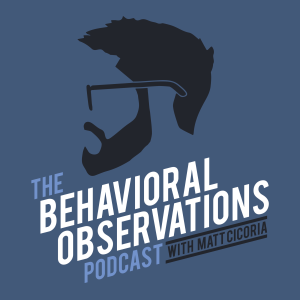
The Behavioral Observations Podcast with Matt Cicoria
Medical
The Behavioral Observations Podcast with Matt Cicoria is an interview-based show that features conversations with innovative scientists and practitioners in the field of Behavior Analysis. The podcast covers topics such as Autism, Functional Behavioral Assessment, Acceptance and Commitment Therapy, Functional Communication Training, Verbal Behavior, and more!
Location:
United States
Description:
The Behavioral Observations Podcast with Matt Cicoria is an interview-based show that features conversations with innovative scientists and practitioners in the field of Behavior Analysis. The podcast covers topics such as Autism, Functional Behavioral Assessment, Acceptance and Commitment Therapy, Functional Communication Training, Verbal Behavior, and more!
Language:
English
Client Assent in Behavior Analysis: Balancing Autonomy & Clinical Progress, Session 313 with Cody Morris
Duration:01:25:43
From Amazon to Autism Care: AI Powered Tools for ABA and Diagnostics: Frontera Series on AI with Grant Sickle
Duration:00:43:51
Culturally Sensitive Approaches to ABA Treatment: Session 311
Duration:00:40:57
Improving Health Routines for Adults with Disabilities Using Synchronous Reinforcement Strategies: Inside JABA 24
Duration:01:01:27
Improving Autism and Law Enforcement Interactions through ABA: Session 309 with Lyndsy Cofield
Duration:00:59:49
Sleep, Autism, and Screen Time: Session 308 with Emily Varon
Duration:01:08:05
Dissociative Identity Disorder through a Behavior Analytic Lens: Session 307 with Brady Phelps
Duration:01:15:01
How to Train Staff and Improve Outcomes in Adult Autism Services: Session 306 with Dr. John Guercio
Duration:01:23:15
Naming Bidireccional: BOP en Español 15 con el Dr. José Alberto Monseco Gómez
Duration:00:57:12
ABA Strategies for Safer Playground Behavior: Inside JABA 23
Duration:01:21:39
Using ABA to Build Better Health and Fitness Habits: Session 303 with Michal Pollack
Duration:01:00:08
AI, Applied Behavior Analysis, and the Future of Clinical Tools: Frontera Series on AI with Sydney Holmes
Duration:00:42:03
Supporting Parents in ABA Services with Valencia Harper from Apollo Behavior: Session 301
Duration:00:50:53
Chronic Absenteeism and School Refusal: Session 300 with Kristen McNeely
Duration:01:16:31
Understanding Repetitive Behavior: Session 299 with Bill Ahearn
Duration:01:34:49
El Estado del Análisis de la Conducta en Puerto Rico con la Dra. Yaniz Padilla Dalmau: BOP en Español 14
Duration:01:23:58
Altering the Relative Efficiencies of Responses for Behavioral Improvement: Session 297 with Steve Ward
Duration:00:56:34
Improving Access to Medical Care for Individuals with Intellectual Disabilities: Session 296 with Brandon Franklin
Duration:01:05:48
Response to Name Interventions for Staff and Caregivers: Inside JABA 22
Duration:01:27:46
Ethical Decision Making in Applied Behavior Analysis: Session 294 with Ilene Schwartz and Beth Kelly
Duration:01:16:36